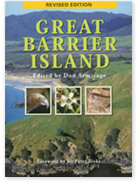Information
Great Barrier Island is a geographically isolated island and as such you will need to be aware of some common limitations of the island.
To ensure you have a safe and enjoyable trip there are some important things to keep in mind when preparing for travel. A trip to Great Barrier Island is the chance to experience eco-tourism at its finest. Take your tramping boots, because the magnificent forests are laced with tracks that lead to the secluded Kaitoke natural hot springs and historic kauri dams.
The white sandy beaches offer fishing, diving, surfing and kayaking. Guides are available to take you to the best places, or you can hire a boat and follow the advice of the friendly locals. While on the island, check out some of the Great Barrier Island events, and if you want to stay on the island for a few days Great Barrier has a great choice of accommodation.
![]() Please Note: There is no street lighting on Great Barrier and many homes are only accessible by bush tracks. There is no reticulated mains power, water supply or sewage system. Electricity is supplied by private generator or alternative power system. It is advisable to bring a torch.
Please Note: There is no street lighting on Great Barrier and many homes are only accessible by bush tracks. There is no reticulated mains power, water supply or sewage system. Electricity is supplied by private generator or alternative power system. It is advisable to bring a torch.
Accommodation
There are a variety of accommodation providers on Great Barrier Island . Please note that demand for accommodation during the main summer holiday period is high, so be sure to book your accommodation in advance. Camping is permitted only in designated camping grounds. More on accommodation.
Cash
It is recommended that travellers take cash, as there are no banks on the island. Eftpos and credit card facilities are available at most commercial outlets.
Dogs
If you plan on bringing your dog to the island, you must carry proof of registration. Dogs are prohibited on all DOC public conservation land. Island inhabitants would prefer it if you did not bring your dog(s).
Electricity
Great Barrier Island is powered by alternative energy power systems - mostly by generator or solar. As there is no street lighting in the evenings it is advisable that you bring a torch with you.
Emergency
In the event of an emergency please dial 111 (Police, Fire). For medical emergencies, dial (09) 429 0356. There is no ambulance on the island.
Fire
Fire is a serious danger on the island and as a result, permits are required for all outdoor fires, with the exception of barbeques. Fireworks require a permit, flares must not be let off except in an emergency and cigarette butts must be fully extinguished and disposed of safely. To report all fires phone 111.
Fuel
Petrol and diesel are available at Port FitzRoy Wharf, Whangaparapara Wharf, Tryphena and Claris. There are no facilities for vehicles which require CNG or LPG.
Internet Access
Internet access on the island is limited. Claris & Tryphena so far are the only areas where you will be able to get broadband internet access.
Mobile phone coverage/Telephone
Mobile phone coverage on the island is limited. Do not expect to rely solely on mobile phones for your communication needs while on Great Barrier Island. Card or coin phones can be found at the main settlements around the island. Please note it is a toll call from Great Barrier Island to Auckland.
Rubbish/Recycling
All rubbish must be disposed of thoughtfully to help maintain the island's natural beauty. A rubbish barge is located in Port FitzRoy Harbour (for the convenience of boat owners) through the summer months to Easter. Household refuse and recyclables can be dropped off at transfer points clearly visible at roadside locations.
Supplies
General stores are located at Port FitzRoy, Whangaparapara Reserve, Claris, Pa Beach and Mulberry Grove at Tryphena. See the 'Shopping on Great Barrier Island' and 'Services on Great Barrier Island' sections of the website for more details.
Transport/Travel
Great Barrier Island is a 35-minute flight or leisurely ferry ride from Auckland. Cars can be taken to Great Barrier on SeaLink’s Eco Islander ferry. The main airfield on the island is at Claris. Another is at Okiwi in the north, which usually operates from the end of October until the end of April each year.
Auckland City Council administers two airfields at Claris and Okiwi making the island accessible by plane. Alternatively, leisure boats can be sailed to the island, or visitors can take a ferry. A network of roads connect the main settlements on the island.
Transfer services and rental vehicles are all readily available. Great Barrier Buses with their People and Post van run a daily service between Tryphena and Port FitzRoy all year as well as scheduled services in the southern part of the island.
 Guidebook
Guidebook
This revised guidebook, edited by Don Armitage, describes Great Barrier Island - its history and natural features, including flora, fauna, habitats and endangered species, both terrestrial and marine. Profusely illustrated in colour, and with maps and sketches.
$39-95 Canterbury University Press, ISBN 1-877257-00-1
Click here if you wish to purchase

